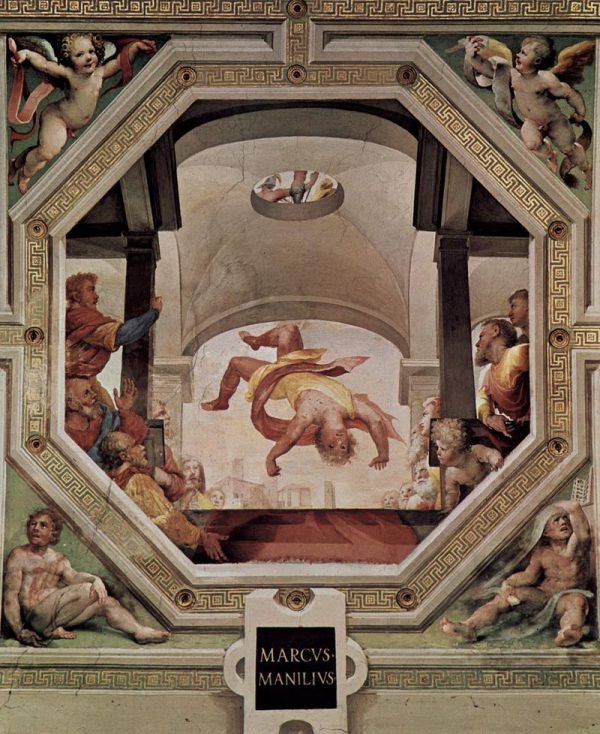Marcus Manlius Capitolinus was a Roman consul in 392 BCE and brother of Aulus Manlius Capitoline. He was a legendary Roman hero.
During the siege of Rome in 390 BCE, Marcus Manlius, with only a small detachment in the citadel (arx), defended himself against the attacks of the besieging Gaul’s Capitol, led by Brennus. The rest of Rome has already surrendered to the invaders.
Manlius was the first to respond to the gaggle of geese warning the Romans of the unexpected attack of the Gauls. Manlius was to run to the fortifications and knock down the first attackers with a shield. This event featured Titus Livy:
[…]for their clamour and the noise of their wings aroused M. Manlius, the distinguished soldier, who had been consul three years before. He snatched up his weapons and ran to call the rest to arms, and while the rest hung back he struck with the boss of his shield a Gaul who had got a foothold on the summit and knocked him down. He fell on those behind and upset them, and Manlius slew others who had laid aside their weapons and were clinging to the rocks with their hands
– Titus Livius, Ab urbe condita, V.47
As a thank you for his heroism, the rest of the defenders gave Manlius some of their food, which was a sign of great gratitude in the face of the famine in the city. For his heroism, Manlius was nicknamed Capitolinus.
After the departure of the Gallic army from the walls of Rome, the plebeians found themselves in a difficult situation. Many of them had to incur debts with patricians and borrow money for survival. Marcus Manlius Captiolinus was one of the supporters of improving the position of the plebeians and was at the head of this movement. The Roman historian – Titus Livius – even stated that he was the first popular in history. Livy tells the story that Manilius, seeing a centurion going to prison (due to debt), decided to buy his freedom and even sell his property to help others in need.
Manlius actively criticized the Senate for unsuccessful policies for plebeians and the embezzlement of public money. The senators began to see Manlius’ actions as dangerous to the upper classes. In this connection, there were accusations of a coup d’état and the restoration of the monarchy.
The Senate decided in 385 BCE to condemn Manlius to death. The sentence was carried out in 384 BCE by decimating it from the Tarpeian Rock. His house was razed to the ground and the area was forbidden by any patrician. Moreover, no one in the Manlius family could bear the name Marcus in the future. Marcus Manlius was considered one of the “martyrs” in the struggle to improve the fate of the poorer strata of Rome.







